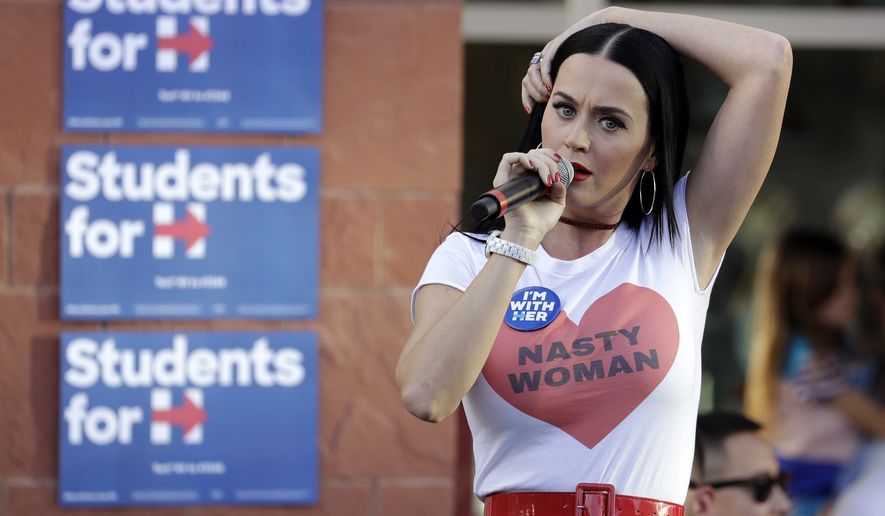The Clinton political team has been adept at spinning Donald Trump’s own words into vicious campaign attacks, and the latest — his debate barb calling Hillary Clinton a “nasty woman” — has injected new vigor into Democrats’ appeal to women to rally and place the first woman in the White House.
The “nasty women” moniker has taken on a life of its own over the past several days, and the insult seems to have backfired against the Republican presidential hopeful. On social media, Clinton supporters are hawking homemade “nasty woman” shirts and other items; Clinton backer and singer Katy Perry wore such a shirt when campaigning for the former first lady in Nevada earlier this week.
Clinton surrogate Sen. Elizabeth Warren, Massachusetts Democrat and hero to the progressive left, used the term as yet another tool to fire up female voters, the vast majority of whom already back Mrs. Clinton over Mr. Trump, polls have shown.
Combined with an 11-year-old video showing Mr. Trump bragging about his ability to grope women without repercussions, the term has become a potent weapon for the Clinton campaign.
“He thinks because he has a mouth full of Tic Tacs he can force himself on any woman within groping distance. Well, I’ve got news for you, Donald Trump. Women have had it with guys like you,” Ms. Warren told a crowd in Manchester, New Hampshire, earlier this week. “And nasty women have really had it with guys like you. Yeah, get this, Donald: Nasty women are tough. Nasty women are smart. And nasty women vote. And on Nov. 8 we nasty women are going to march our nasty feet to cast our nasty votes to get you out of our lives forever.”
The “nasty woman” quip is just the latest example of how the most effective attacks on Mr. Trump often have come in the form of simply repeating the businessman’s own words.
Earlier in the election cycle, for example, Mr. Trump accused Mrs. Clinton of playing “the woman card.” Within days the Clinton campaign began selling literal “woman cards,” small, credit cardlike items that retail for $5 on Mrs. Clinton’s campaign website.
The term also has found its way onto other pieces of Clinton merchandise.
Specialists say that while there have been other clear examples of candidates’ comments getting them in trouble, Mr. Trump has taken the art of verbal self-destruction to new heights.
“It is rare for campaigns to be able to turn an opponent’s own words directly into political appeals. Most office seekers are careful about what they say to prevent this from happening. Trump is completely tone deaf about his words,” said Darrell West, vice president of governance studies at the Brookings Institution. “He has no ability to understand how his own language can be used against himself. This is one way his political inexperience really hurts him.”
While Mrs. Clinton hasn’t brought “nasty woman” into her own political lexicon, she’s seized on Mr. Trump’s “woman card” remark throughout this campaign season.
“If fighting for women’s health care and paid family leave and equal pay is playing the woman card, then deal me in,” she’s said at dozens of rallies over the past few months.
The approach seems to be working. Most polls show Mrs. Clinton with a double-digit lead among women voters, providing a counterbalance to Mr. Trump’s sizable lead among male voters.
A recent CBS News poll, for example, shows Mrs. Clinton with an 18-point edge among women, while Mr. Trump leads by 11 points among men.
But the Clinton campaign has gone beyond women’s issues in their effort to turn Mr. Trump’s remarks against him.
One of the campaign’s centerpiece commercials features nothing more than clips of Mr. Trump speaking. The advertisement includes Mr. Trump’s campaign launch comments referring to some illegal immigrants as “rapists”; an incident late last year when he seemed to mock a reporter with a physical disability; his claim that Republican Sen. John McCain isn’t a war hero because he was captured; and other controversial comments.
Recently, Mrs. Clinton has seized on Mr. Trump’s belief that the Nov. 8 election will be “rigged” against him and the billionaire’s murky statements about whether he’ll accept the result of the White House contest.
“Now his final target is democracy itself,” she said, charging that Mr. Trump is undermining the fabric of American democracy.
The Trump campaign’s current position is that the candidate will accept the election results absent any evidence of substantial voter fraud or other troubling issues.
Political analysts say that using an opponent’s own words in commercials or at rallies dates back decades. For example, a 1964 Lyndon Johnson ad featured Republican Barry Goldwater’s claim that nuclear bombs were “merely another weapon” alongside video footage of explosions and mushroom clouds.
In 2012, President Obama’s team crafted commercials around Republican Mitt Romney’s claim that the “47 percent” of Americans who don’t pay income taxes will always vote Democrat no matter what.
While the tactic has had some success in the past, Mr. Trump has provided a uniquely large amount of material for his opposition.
“This technique works best for a very controversial candidate who has loads of hot-button remarks on video or audio tape. That sounds like Donald Trump to me,” said Larry Sabato, director of the Center for Politics at the University of Virginia.
• Ben Wolfgang can be reached at bwolfgang@washingtontimes.com.




Please read our comment policy before commenting.